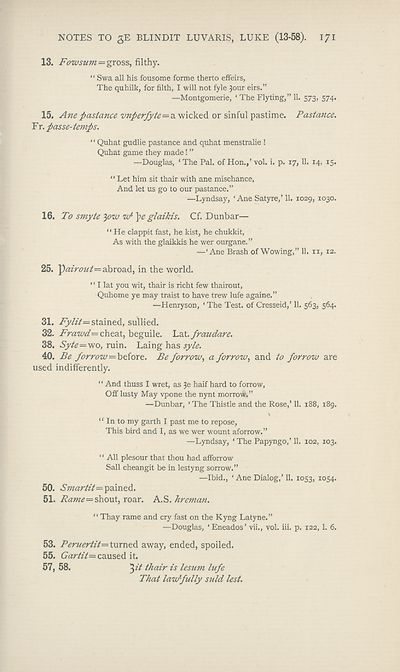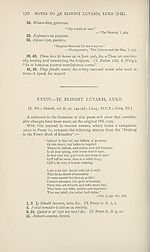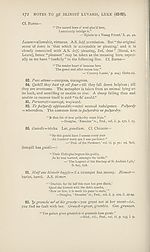Download files
Complete book:
Individual page:
Thumbnail gallery: Grid view | List view

NOTES TO gE BLINDIT LUVARIS, LUKE (13-58). I/I
13. Fowsum = gross, filthy.
“ Swa all his fousome forme therto effeirs,
The quhilk, for filth, I will not fyle Jour eirs.”
—Montgomerie, ‘ The Flyting,” 11. 573, 574.
15. Ane fiaslance vnfierfyte=2L'M\c\tz& or pastime. Pastance.
F r. passe-temps.
‘ ‘ Quhat gudlie pastance and quhat menstralie !
Quhat game they made! ”
—Douglas, ‘The Pal. of Hon.,’ vol. i. p. 17, 11. 14, 15.
“ Let him sit thair with ane mischance,
And let us go to our pastance.”
—Lyndsay, ‘Ane Satyre,’11. 1029, 1030.
16. To smyte ^ow w1 \e glaikis. Cf. Dunbar—
‘ ‘ He clappit fast, he kist, he chukkit,
As with the glaikkis he wer ourgane.”
—‘Ane Brash of Wowing,” 11. ix, 12.
25. abroad, in the world.
“ I lat you wit, thair is richt few thairout,
Quhome ye may traist to have trew lufe againe.”
—Henryson, ‘The Test, of Cresseid,’ 11. 563, 564.
31. ^y///=stained, sullied.
32. /rra'Z£/tf,= cheat, beguile. Lat. fraudare.
38. Syte=vro, ruin. Laing has syle.
40. Be farrow = before. Be forrow, a forrow, and to forrow are
used indifferently.
“ And thuss I wret, as Je haif hard to forrow,
Off lusty May vpone the nynt morrow.”
—Dunbar, ‘ The Thistle and the Rose,’ 11. 188, 189.
%
“ In to my garth I past me to repose,
This bird and I, as we wer wount aforrow.”
—Lyndsay, ‘ The Papyngo,’ 11. 102, 103.
‘ ‘ All plesour that thou had afforrow
Sail cheangit be in lestyng sorrow.”
—Ibid., ‘ Ane Dialog,’ 11. 1053, 1054.
50. 6';;?arA/'= pained.
51. shout, roar. A.S. hreman.
“ Thay rame and cry fast on the Kyng Latyne.”
—Douglas, ‘Eneados’ vii., vol. iii. p. 122, 1. 6.
53. turned away, ended, spoiled.
55. caused it.
57, 58. 3*/ thair is lesum lufe
That lawfully suld lest.
13. Fowsum = gross, filthy.
“ Swa all his fousome forme therto effeirs,
The quhilk, for filth, I will not fyle Jour eirs.”
—Montgomerie, ‘ The Flyting,” 11. 573, 574.
15. Ane fiaslance vnfierfyte=2L'M\c\tz& or pastime. Pastance.
F r. passe-temps.
‘ ‘ Quhat gudlie pastance and quhat menstralie !
Quhat game they made! ”
—Douglas, ‘The Pal. of Hon.,’ vol. i. p. 17, 11. 14, 15.
“ Let him sit thair with ane mischance,
And let us go to our pastance.”
—Lyndsay, ‘Ane Satyre,’11. 1029, 1030.
16. To smyte ^ow w1 \e glaikis. Cf. Dunbar—
‘ ‘ He clappit fast, he kist, he chukkit,
As with the glaikkis he wer ourgane.”
—‘Ane Brash of Wowing,” 11. ix, 12.
25. abroad, in the world.
“ I lat you wit, thair is richt few thairout,
Quhome ye may traist to have trew lufe againe.”
—Henryson, ‘The Test, of Cresseid,’ 11. 563, 564.
31. ^y///=stained, sullied.
32. /rra'Z£/tf,= cheat, beguile. Lat. fraudare.
38. Syte=vro, ruin. Laing has syle.
40. Be farrow = before. Be forrow, a forrow, and to forrow are
used indifferently.
“ And thuss I wret, as Je haif hard to forrow,
Off lusty May vpone the nynt morrow.”
—Dunbar, ‘ The Thistle and the Rose,’ 11. 188, 189.
%
“ In to my garth I past me to repose,
This bird and I, as we wer wount aforrow.”
—Lyndsay, ‘ The Papyngo,’ 11. 102, 103.
‘ ‘ All plesour that thou had afforrow
Sail cheangit be in lestyng sorrow.”
—Ibid., ‘ Ane Dialog,’ 11. 1053, 1054.
50. 6';;?arA/'= pained.
51. shout, roar. A.S. hreman.
“ Thay rame and cry fast on the Kyng Latyne.”
—Douglas, ‘Eneados’ vii., vol. iii. p. 122, 1. 6.
53. turned away, ended, spoiled.
55. caused it.
57, 58. 3*/ thair is lesum lufe
That lawfully suld lest.
Set display mode to: Large image | Zoom image | Transcription
Images and transcriptions on this page, including medium image downloads, may be used under the Creative Commons Attribution 4.0 International Licence unless otherwise stated. ![]()
| Publications by Scottish clubs > Scottish Text Society publications > Old series > Poems of Alexander Scott > (199) |
|---|
| Permanent URL | https://digital.nls.uk/106969567 |
|---|
| Description | A collection of over 100 Scottish texts dating from around 1400 to 1700. Most titles are in Scots, and include editions of poetry, drama, and prose by major Scottish writers such as John Barbour, William Dunbar, Gavin Douglas, and George Buchanan. Edited by a key scholarly publisher of Scotland's literary history, and published from the late 19th century onwards by the Scottish Text Society. Available here are STS series 1-3. |
|---|

